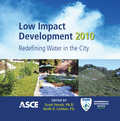Surface Temperature and Heat Exchange Differences between Pervious Concrete and Traditional Concrete and Asphalt Pavements
Publication: Low Impact Development 2010: Redefining Water in the City
Abstract
Permeable pavement has been used successfully for many years to provide stormwater control and has recently become a common feature in low impact development (LID) projects. Recently, the potential benefits of pervious concrete over traditional impervious concrete and asphalt pavements for reducing surface temperatures, sequestering carbon, improving health of adjacent trees, and more have been identified. Isolated studies have quantified these benefits for a select few cases. Additional studies are needed to continue to expand the knowledge base of the benefits of pervious concrete beyond stomrwater management. This paper addresses this need by presenting results quantifying the impact of pervious concrete on surface temperatures in semi-arid urban environments. Surface and internal temperatures were monitored at a new pervious concrete site, an adjacent traditional concrete site, and a traditional asphalt pavement site. The results from the summer of 2009 showed a significant reduction of surface temperature at the pervious concrete site compared to the asphalt site. Interestingly, as the monitoring moved into June the traditional concrete site became shaded, providing a comparison between pervious concrete and shaded traditional concrete. The surface temperatures were very similar, leading to the conclusion that pervious concrete may serve as a UHI mitigation measure equivalent to shading of traditional concrete. The results of the surface and internal temperature monitoring of the pervious concrete were used to calibrate and validate a numerical heat flux model. The model was used to analyze the relative impact of pervious concrete aggregate selection and thermophysical properties on surface temperatures, heat exchange to the earth, and heat exchange with atmosphere.
Get full access to this article
View all available purchase options and get full access to this chapter.
Information & Authors
Information
Published In
Copyright
© 2010 American Society of Civil Engineers.
History
Published online: Apr 26, 2012
Authors
Metrics & Citations
Metrics
Citations
Download citation
If you have the appropriate software installed, you can download article citation data to the citation manager of your choice. Simply select your manager software from the list below and click Download.
